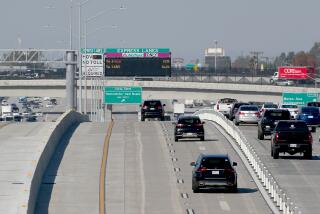California DMV says Uber, Lyft, Sidecar cars need commercial plates
Uber, Lyft, Sidecar and other ride-hailing service drivers make money with their cars. So should they be required to carry commercial license plates? The California Department of Motor Vehicles says yes.
In a memo issued this month, the DMV cited the California Vehicle Code and said “any passenger vehicle used or maintained for the transportation of persons for hire, compensation, or profit is a commercial vehicle. Even occasional use of a vehicle in this manner requires the vehicle to be registered commercially.”
A DMV spokesman said the memo is a “reminder” of an existing law on the books since 1935. It appears to address transport network companies (TNCs), whose drivers use their own cars, most of which are registered as personal vehicles. Passengers and drivers link up using mobile apps from the ride-hailing companies, which also contract with the drivers and handle the financial transactions.
The business implications could be huge, said George Wilk, an insurance agent for America Business Insurance, which specializes in commercial insurance. If a vehicle is registered as commercial, it must also carry commercial insurance, which is “a different animal” from personal insurance.
Wilk said a personal policy might cost $800 to $1,200 a year, while a commercial policy can cost two or three times as much because it anticipates that a driver will be using his or her car more often and be at greater risk of having an accident.
The DMV’s reminder -- which was first reported by BuzzFeed -- follows rules set in September 2013 by the California Public Utilities Commission, which regulates TNCs in California. The PUC’s rules and state statutes require TNC drivers to drive their own private vehicles, but do not specify a particular type of registration.
“It is the TNCs’ responsibility to ensure their business model complies with all state laws,” PUC spokeswoman Terrie Prosper said.
The memo, posted to the DMV’s website, did not specify when drivers have to comply with the rules. However, Mike Harris, a spokesman for the California Highway Patrol, said anyone violating the law will be cited. The CHP will “enforce it just like any other registration violation.”
As to whether any ride-hailing drivers have been cited previous to the memo, Harris said those statistics are lumped in with all registration violations, and determining that would require combing through hundreds of thousands of records.
Spokeswomen for the ride-hailing companies said the DMV’s rules undermine the broader set of rules laid out by the PUC.
“Requiring Lyft drivers, including those who drive just a few hours a week, to get commercial plates would essentially treat peer-to-peer transportation the same as a taxi, undermining the thoughtful work done by the CPUC to craft new rules for ride-sharing in California,” Lyft spokeswoman Chelsea Wilson said.
“Over 80% of Sidecar drivers are part-time or occasional drivers, giving rides on their way to work or to supplement their income,” Sidecar spokeswoman Margate Ryan said. “Everyday Californians using their car in this capacity shouldn’t be required to hold a commercial license.”
And Mike Montgomery, executive director of tech industry group CALinnovates, issued a statement saying the DMV cites a “nearly 80-year-old law” and is “throwing more tacks on the road to deflate this emerging industry.”
Wilson told The Times that Lyft is meeting with the DMV for further discussion. Uber is “currently exploring its options,” spokeswoman Eva Behrend said.
Twitter: @traceylien







